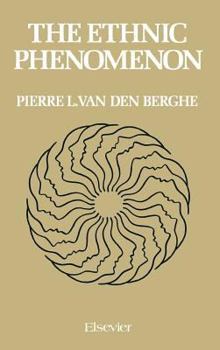The Ethnic Phenomenon
Select Format
Select Condition 
Book Overview
A gem of a book for scholars in race and ethnic relations and sociobiology. . . . Van den Berghe analyzes various forms that race and ethnic relations have displayed including colonial empires, slavery, middleman minorities, caste systems, and assimilation. The causes and consequences of these systems are brilliantly teased out employing historical and crosscultural examples. Libraries with any work at all on race and ethnic relations or sociobiology should acquire this book. Choice
Format:Hardcover
Language:English
ISBN:0444015507
ISBN13:9780444015501
Release Date:May 1981
Publisher:Praeger
Length:301 Pages
Weight:2.20 lbs.
Dimensions:0.8" x 6.0" x 9.0"
Customer Reviews
3 ratings
A great work on Sociobiology.
Published by Thriftbooks.com User , 16 years ago
Despite having been written nearly 30 years ago this book stands as a landmark in the field of sociobiology. It is an exceptional book and I highly recommend it. The book covers the topic of Kin Selection, which is a hallmark of evolutionary psychology/ sociobiology. While some scientists do disagree as to whether sociobiology is the be-all and end-all for explaining human behavior, it is still interesting and helpful in certain situations. (Edward O. Wilson is the founder. You can learn more by reading Sociobiology: The Abridged Edition or On Human Nature: Revised Edition) For an introduction to this discussion, or just further reading, I recommend: The Blank Slate: The Modern Denial of Human Nature, Human Nature: Fact And Fiction - Literature, Science And Human Nature or The Origin and Evolution of Cultures (Evolution and Cognition).
Ethnocentrism As Nepotism Among Extended Kin
Published by Thriftbooks.com User , 16 years ago
Ethnocentrism and Kin Selection Van den Berghe's central claim is that racism, xenophobia, nationalism and ethnocentrism can be understood as kin-selected nepotism (Hamilton 1964). In the same way evolution favours individuals who sacrifice themselves for the benefit of their kin, because they share genes by common descent, he argues that individuals may also favour their extended kin, namely fellow ethnics. Before reading the book I was doubtful as to whether the degree of kinship shared among fellow-ethnics would be sufficient to invoke the application of Hamilton's Rule (Brigandt, I. 2001; but see Salter 2004 or On Genetic Interests: Family, Ethnicity, and Humanity in an Age of Mass Migration). However, contrary to both critics (Brigandt, I. 2001) and others developing similar ideas (Rushton 2005; Salter 2000), van den Berghe is agnostic as to whether ethnocentricism is adaptive in modern societies where the shared kinship of nations or ethnies are largely fictive, and suggests this may be the misfiring of a mechanism that evolved among small kin-based hunter-gatherer groups (p35). He certainly emphasises that ethnic sentiments are vulnerable to manipulation by exploitative elites (e.g. kinship terms such as `fatherland' and `brothers-in-arms' encouraging sacrifice during wartime) but concludes "kinship can be manipulated but not manufactured" (p27). Van den Berghe views race-based discrimination (i.e. discrimination on the basis of heritable physiological phenotypic group differences such as skin colour) as relatively rare historically, because different races rarely came into contact before recent technological advances in transportation. Therefore, cultural rather than racial markers are adopted to distinguish ethnic groups (e.g. language, clothing, bodily modification). What is innate is not racism but ethnocentrism. However, where racial differences do exist within a population, these are likely to be especially salient. The analysis in the central section of the book, discussing various historically recurrent situations as slavery, caste and colonialism, is by no means dependent acceptance of the sociobiological basis of ethnocentrism and is worth reading even for readers unconvinced of this thesis - or even sceptical of sociobiological approaches to human behaviour altogether. Synthesising Marxism and Sociobiology? Given its potential appeal to nationalists, it is surprising the extent to which van den berghe's draws on Marxism. Sociobiologists themselves have frequently noted the potential compatibility of a Marxist analysis of contemporary society with sociobiology (e.g. Sanderson 2001; van den Berghe 1979: p82n), although van den Berghe remains the only figure to actually successfully synthesise the two forms of analysis to produce novel theory. For example, he argues that the class exploitation inherent in contemporary and historical societies is disguised by an `ideology' that disguises exploitation as either kin-selected nepotis
Masterpiece of disillusionment: Marx meets E.O. Wilson
Published by Thriftbooks.com User , 27 years ago
Van Den Berghe is a white sociologist born in the old Belgian colony of the Congo. Disgusted by white oppression of Africans, he became a fairly conventional liberal on race relations. But, as he overcame his Eurocentric focus on white crimes, he realized that race-based exploitation and violence are universal human curses. This lead him to sociobiology, and its bedrock finding: the theory of kin selection: The more genes we share with another individual, the more altruistic we are toward him. And the less kind we are toward our more distant kin.Since there is no fundamental boundary between family, ethnic group, and race, Van Den Berghe coined the brilliant term "ethnic nepotism" to describe the human tendency to favor "our people" at the expense of others.This is the most significant advance ever in the Marxist analysis of economic exploitation. By substituting kinship for class as the great engine of history, Van Den Berghe has invented a neo-Darwinian Marxism with enormous explanatory power and predictive power. This 1981 book's accuracy was confirmed by the subsequent breakup of the communist world into clashing ethnic groups.Steve Sailer





